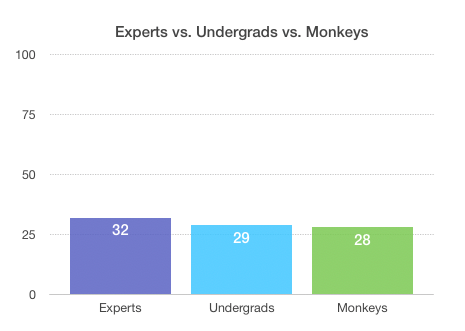Millennials seem to believe anything that comes from the mouth of an “expert.” Even the older Millennials are probably too green to realize that listening to experts will produce worse results than going with your gut.
It works like this . . . when we go with our gut (or some non-expert’s suggestion), we build in a wide margin for error. We recognize the fallibility of our own judgment and proceed with due caution.
According to authors of a study on experts by the Institute for Operations Research and the Management Sciences:
“The short answer is that they [experts] are of little value in terms of accuracy. In addition, they lead people into false confidence.” —Institute for Operations Research and the Management Sciences, 2007 in ScienceDaily
But when we act on a supposed expert’s advice, we proceed more boldly, assuming the expert to be right. Being right, after all, is what we hire experts for.
It turns out that, though, that experts are no more accurate than college undergrads. Or monkeys throwing darts.
Experts and Undergrads and Monkeys #
The 2007 study by the Institute for Operations Research and the Management Sciences (which is two syllables shy of a novel) compared experts against college undergrads in their abilities to predict outcomes and best courses of action. The study found that experts were only slightly more accurate than college kids.
And monkeys throwing darts were about the same as both.

I’d go with monkeys throwing darts. That sounds like more fun than watching experts rubbing their chins or students scratching their heads.

Victor Davis Hanson vs. Experts #
A blog post by Victor Davis Hanson triggered all these thoughts this morning.
VDH itemized how our mediocracy, the remnants of the post-war aristocracy, has let us down. From Our Exhausted Mediocracy:
Economic Experts Failed
Remember the “new normal”? Our economic czars had simply decided anemic economic growth was the best Americans could expect and that 3 percent annualized GDP growth was out of the realm of possibility. Big government incompetence combined with Wall Street buccaneerism had almost melted down the economy in 2008. Recent presidents had doubled the debt—twice.
Foreign Policy Experts Failed
Few could explain how recent agreements such as the Paris Climate Accord or Iran deal could ever have achieved their stated aims, much less were in America’s interest. War planners had not translated interventions in Afghanistan, Iraq, and Libya into strategic advantage—much less lasting victory—and never offered reasons to be in such places that appealed to half the country.
Industry and Labor Experts Failed
Most elites had assumed the deindustrialized red-state interior was doomed to a sort of preordained and irreversible decline, much of it supposedly self-induced. In more candid moments, elites jested that red-state losers might be better replaced by new immigrants, both legal and illegal.
Education Experts Failed
Our ruling classes either could not or would not defend American traditions and civilization in our colleges, in our government, and in our popular culture—and they were increasingly accepting of the globalist consensus that America had a flawed past requiring some sort of reparatory future.
Cultural Experts Failed
Our leadership accepted a world in which America’s misdemeanors were the source of global outrage, while China’s felonies were largely exempt from criticism. China’s global hegemony was seen as assumed and fated. Efforts to derail it were near inane or retrograde.
So We Voted for Trump
Most Americans figured that those who lectured them on television, in op-eds, and throughout popular culture about guns, open borders, green mandates, fossil fuels, and the public schools, had the money, desire, and clout to live in desirable neighborhoods, sometimes behind walls, with ample taste for fine cars, jet trips, and private academies for their children.
Trump Is the Anti-Expert #
Even Trump’s most ardent supporters take his statements with a grain of salt. We know Trump exaggerates because he told us so in his book, The Art of the Deal page 58
The final key to the way I promote is bravado. I play to people’s fantasies. People may not always think big themselves, but they can still get very excited by those who do. That’s why a little hyperbole never hurts. People want to believe that something is the biggest and the greatest and the most spectacular. I call it truthful hyperbole. It’s an innocent form of exaggeration—and a very effective form of promotion.
(If you’ve read the book, nothing about President Trump should surprise you.)
VDH makes the point that those who vilify Trump are actually the biggest defenders of the failed status quo.
People like Bill Kristol, who once suggested seriously that we kill all the white people in the Rust Belt and replace them with illegal aliens who are desperate for work.
People like Jonah Goldberg who wants us to accept his a priori syllogism that good character requires perfect character, Donald Trump’s character is imperfect, therefore Donald Trump has bad character. (I am not making this up.)
Says Victor Davis Hanson in Our Exhausted Mediocracy:
Much of the Trump agenda, although nominally embraced by the Republican Party after the July 2016 convention, was largely crafted in antithesis to the bipartisan status quo that either could not or would not end illegal immigration, secure the border, call China out on warping world trade, seek greater reciprocity with allies, curtail optional military interventions, massively deregulate, expand fossil fuel production, and return the federal judiciary to a constitutional and constructionist framework.
Kill the Post-WWII World Order #
The murderous hatred seething from the lips and eyes of Maxine Waters, Bill Kristol, and the rest of the old elite is a sign of their intelligence. They realize their world order is in a life-or-death struggle for survival. Donald Trump came to bury the post-WWII era, not to praise it.
And the death of the post-WWII world order was inevitable.
My dad and many of my uncles were WWII vets. I revere them. I revere the men and women who rebuilt the world after the Nazis and the Japanese Empire nearly destroyed it.
But history moves in cycles of 80 to 100 years and WWII ended 74 years ago. The institutions that rebuilt the world cannot manage what comes next, and the people will not allow them to.
The experts we have today are experts of those dying institutions. We don’t need them anymore.
The Fourth Turning, Again #
CORNWALLIS: How did it come to this? An army of rabble. Peasants . . . Everything will change . . . everything has changed.
—Mel Gibson’s The Patriot
We are approaching the climax of the Fourth Turning of the American history cycles, the end of the post-WWII era. As General Cornwallis said at the end of the first turning as American forces overran his British Army in Virginia, “everything will change.” Cornwallis recognized that the era in which he’d lived his entire life was over.
As Howe and Strauss predicted in 1997:
The Crisis resolution will establish the political, economic, and social institutions with which our children and heirs will live for decades thereafter. Fresh from the press of history, the new civic order will rigidify around all the new authorities, rules, boundaries, treaties, empires, and alliances. The Crisis climax will recede into the public memory—a heart-pounding memory to all who will recall it personally, a pivot point for those born in its aftermath, the stuff of myth and legend for later generations. And, for better or worse, everyone who survives will be left to live with the outcome.
Before that, there will be hell to pay. And the Baby Boomers will become fire bombers again:
The full dimension of the Boomer persona will only emerge when today’s better-known 1940s birth cohorts (whose youth was marked by relatively few social pathologies) are joined in public life by the tougher-willed, more evangelical 1950s cohorts (whose youth was marked by many more pathologies). That is the mix that will beget this generation’s elder priest-warrior persona, vindicating the early Unraveling-era warning of Peter Collier and David Horowitz that Boomers are “a destructive generation whose work is not over yet.”
Trump is clearly one of the “elder priest-warrior” personas Howe and Strauss wrote about. He is opposed by others, the priest-warriors of the status quo. And the outcome means everything:
If they triumph, they will collectively deserve the eulogy Winston Churchill offered to Franklin Roosevelt: to die “an enviable death.” If they fail, their misdeeds will cast a dark shadow over the entire twenty-first century, perhaps beyond. Whatever the outcome, posterity will remember the Boomers' Gray Champion persona long after the hippie and yuppie images have been forgotten to all but the historian.
As you look ahead to what 2019 might hold, remember that we’ve been here before. But the stakes are very high. As high, as VDH wrote today, as they were to “late 4th-century B.C. Athenian politicians, the last generation of the Roman Republic, the late 18th-century French aristocracy, or the British bipartisan elite of the mid-1930s.”
We will not go back, as many conservatives and liberals wish we could. We can only go forward. Society will change more, and more permanently, in the next 5 years than is has in the past 75 years. Today’s experts are completely unequipped to foresee what lies ahead. We are in the time of prophets.
Buckle up and grab your Rosaries. It’s going to be a wild run.
